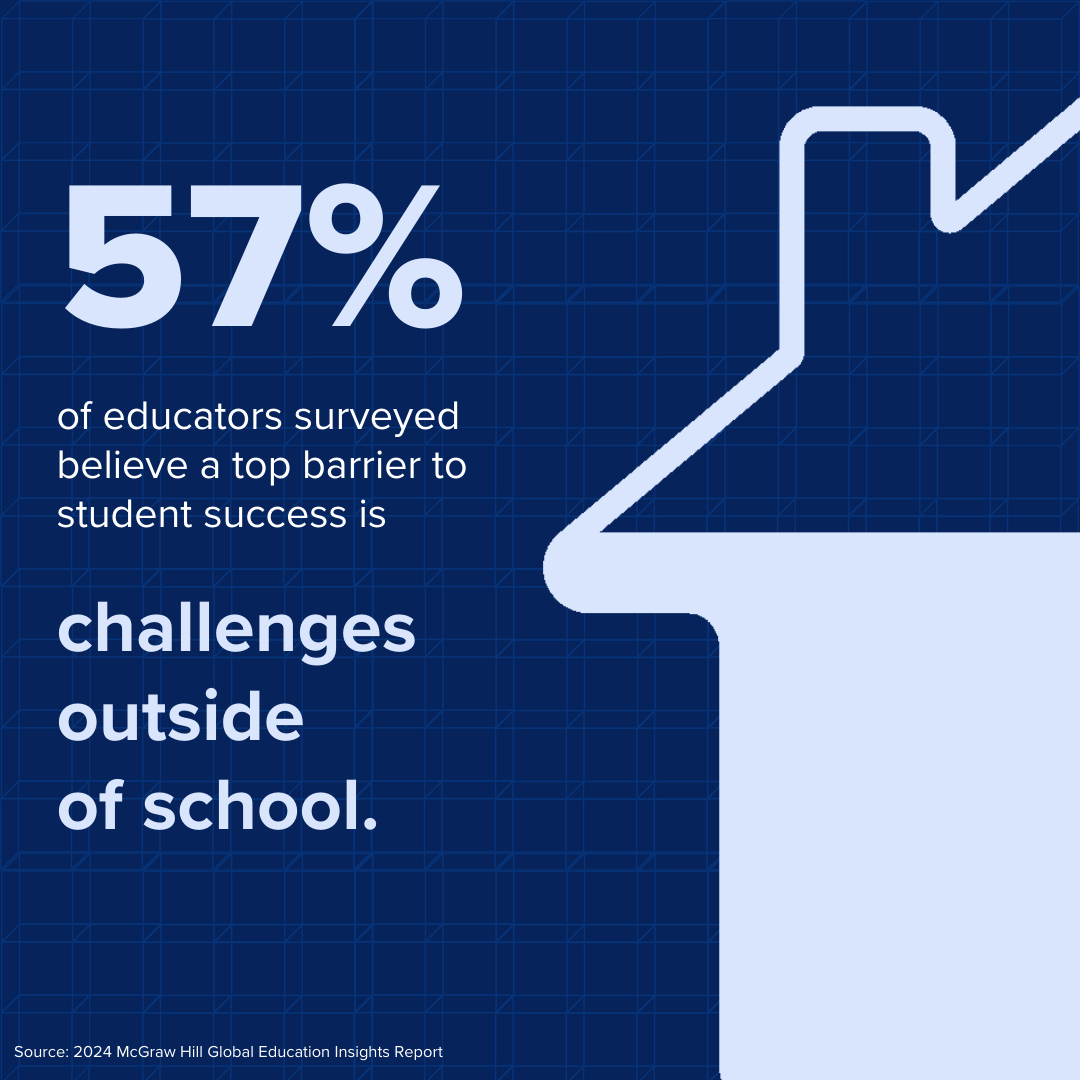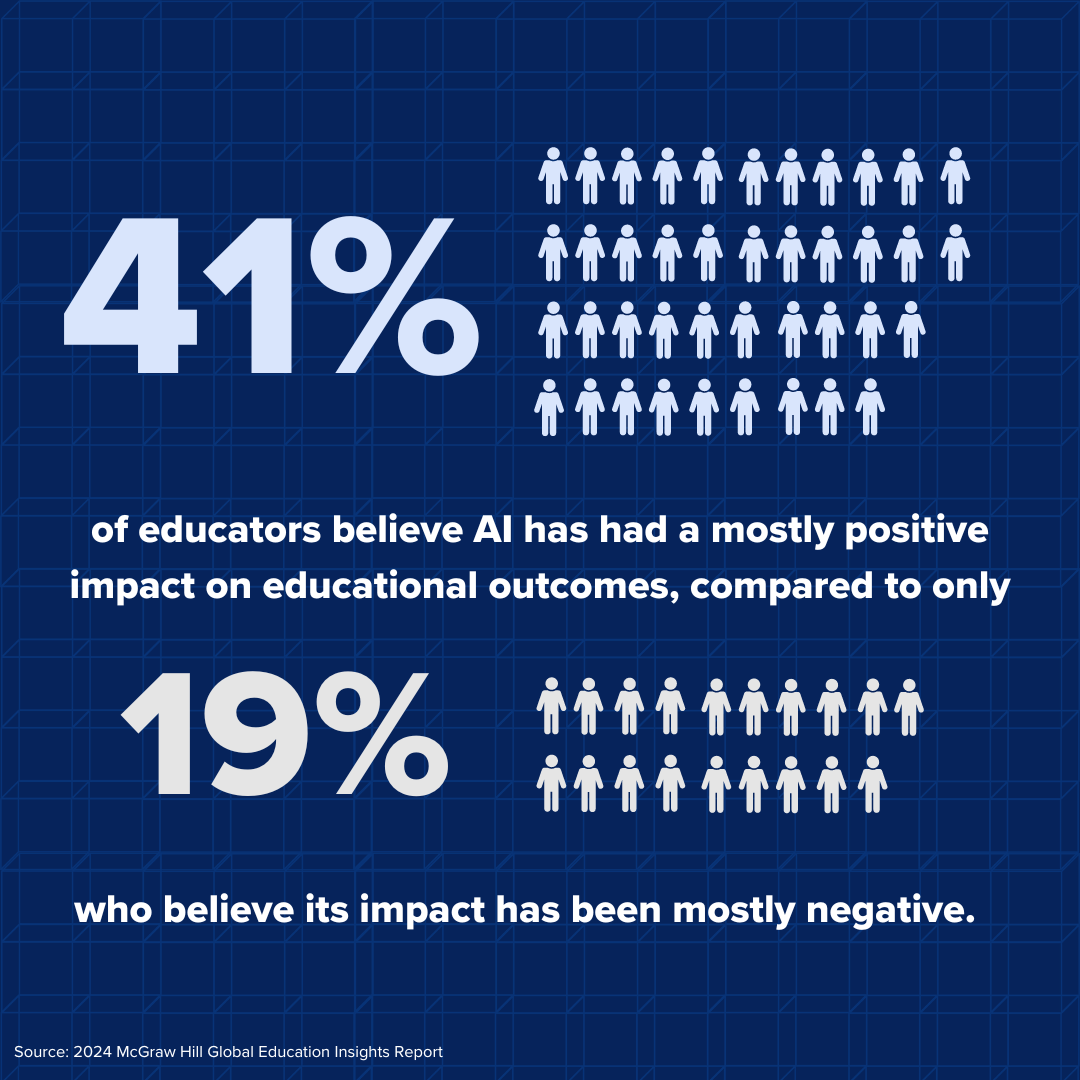COLUMBUS, Ohio, April 16, 2024 (GLOBE NEWSWIRE) -- According to a new report from leading global education company McGraw Hill, educators believe the biggest obstacles to student success in school are tied to challenges outside the classroom, including mental health and behavior issues. While some educators worry that technology and artificial intelligence (AI) might have a negative effect in these areas, many see the positive impact of AI on students’ ability to learn in their preferred languages, improved grades and career readiness.
The McGraw Hill Global Education Insights Report: Learning Outcomes & the Digital Classroom, conducted in February 2024 by Morning Consult on behalf of McGraw Hill, surveyed the opinions of over 1,000 K-12 and Higher Ed educators in 19 countries, including the U.S., Canada, and in northern Europe, Latin America, Asia and the Middle East.
57% of educators ranked challenges outside the classroom, such as issues at home and insufficient family support, as the largest obstacle to student success. Barriers such as student behavioral and mental health struggles and students not having the foundational skills and knowledge to succeed at their grade level were also ranked near the top of the list. On AI in the classroom, educators said they are most concerned that it will negatively impact students’ social skills, critical thinking, academic integrity, creativity and memory retention.

“We must do all we can to ensure educators around the world feel supported at every level, so they can help students overcome these obstacles and succeed,” said Simon Allen, McGraw Hill CEO. “It’s understandable that educators would feel anxiety and uncertainty about the effects emerging technologies and AI have on their students. So it’s important that we look for opportunities where it can dispel this anxiety, where technology can save educators time and facilitate student-teacher engagement.”
41% of educators across all six regions believe AI has had a mostly positive impact on educational outcomes, compared to 19% who believe its impact has been mostly negative.
The top two benefits of AI that educators believe will have a positive impact on education were: reducing time spent by them on administrative tasks (65%) and the ability to personalize learning experiences of each student (63%).

However, educators also identified areas of concern around the use of AI, including negative effects on academic integrity (32%), critical thinking (31%), memory retention (30%), and social skills and relationships (29%). Among US Higher Ed educators, the group that perceived AI most negatively, the areas in which the perceived negative impact was most strong were academic integrity (68%), critical thinking (62%) and "social skills/relationship” (58%).
- 32% of educators are already using GenAI, which increases to 63% when including those who have either used or are expecting to use it in the next year. 80% have either already used GenAI or are expecting to use it at some point in the future.
- 48% of educators say they would mostly or completely trust the accuracy of information students get from GenAI chatbots and 48% say they only slightly trust it or not trust it at all, showing a dramatic split in sentiment.
- “High costs of purchasing the technology” (47%), “Lack of time to implement and train educators on how to use the technology effectively” (38%), and “Data privacy concerns” (34%) were cited as the biggest barriers to technology implementation. K-12 educators are consistently more likely than higher education instructors to say their school lacks adequate funding for technology.
- 72% believe that their school needs to provide more guidance on the use of emerging technology.
Educators globally call for increasing funding for education
When asked to rank their biggest priorities for policymakers and school leaders to address to improve student success, 49% of those surveyed chose increasing funding for education. In the U.S., Canada and northern Europe, educators prioritized increasing teacher pay as a key topic for policy makers to address, while in Latin America, the Middle East and Asia nearly half of educators prioritized better training and support.
Asked what policymakers and government leaders should focus on when it comes to the implementation of technology in the classroom, educators globally prioritized protecting student and school data (48%) as well as establishing safeguards around plagiarism and cheating (47%).
“As education leaders in government, at institutions and in our industry look to build solutions that will help students around the world succeed going forward, it’s important that we listen to those individuals who are working with students every day and do all we can to help support and empower them,” Allen said.
To read the full survey report and view additional insights by region, visit: https://mheducation.postclickmarketing.com/global-education-insights-report-2024.
McGraw Hill
McGraw Hill is a leading global education company that partners with millions of educators, learners and professionals around the world. Recognizing their diverse needs, we build trusted content, flexible tools and powerful digital platforms to help them achieve success on their own terms. Through our commitment to equity, accessibility and inclusion, we foster a culture of belonging that respects and reflects the diversity of the communities, learners and educators we serve. McGraw Hill has over 40 offices across North America, Asia, Australia, Europe, the Middle East and South America, and makes its learning solutions for PreK-12, higher education, professionals and others available in more than 80 languages. Visit us at mheducation.com or find us on Facebook, Instagram, LinkedIn or Twitter.
Contact:
Tyler Reed
McGraw Hill
(914) 512-4853
tyler.reed@mheducation.com
Photos accompanying this announcement are available at
https://www.globenewswire.com/NewsRoom/AttachmentNg/100294f7-4cd5-4cdc-b912-8fa8be5937d1
https://www.globenewswire.com/NewsRoom/AttachmentNg/65e59f2b-1a7a-4109-a408-ac7b8648ec65





